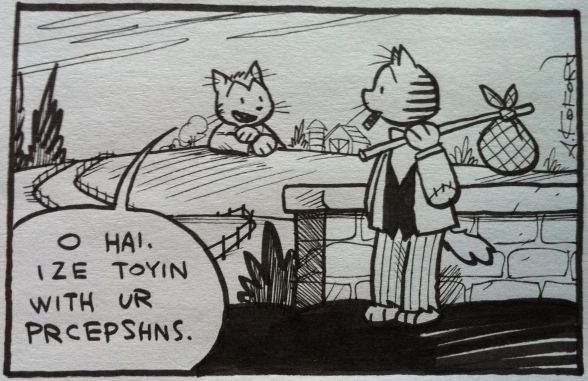I Am a Strange Loop, Hofstadter. Non-fiction. I am (it turns out, several months later) not going to be able to say in this review everything that I want to. IAaSL is at a first approximation a deeper exploration of some of the recurring themes in Hofstadter’s work: most notably, consciousness (which he asserts is equivalent to a “soul”, and I don’t see a lot of reason to differ on that point), how it arises, and what it means.
Hofstadter spends a lot of time in the book asserting that my model of you is an extension of your consciousness. For a number of reasons, I am unable to buy it: I’m fully prepared to accept that my consciousness is more or less an accident of the way my senses work, and, especially, how my sensory/processing system feeds back into itself. My model of me, though, is based on observations of my actions, not the same direct feedback that brought me to consciousness. Similarly, my model of you doesn’t have any direct feedback relationship with your senses. Yes, you can tell me what you know about why you do things, but 1) no one has perfect knowledge of why one does things, and 2) your reports are delayed by time and filtered by both your senses and your model of you. My model of you is never going to surprise me with some insight into itself.
The time-sensitivity in feedback is, I think, a vital element that I’m not sure Hofstadter sufficiently respects. I’m fascinated by the study that showed our inability to tickle ourselves is very tightly time-limited (if you delay the result of my action enough (and it doesn’t take much), I will find it more tickling than if you don’t).
One thought that keeps coming up for me goes something like this: I am (i.e., my consciousness is) the total of my memories and my sensory input. So, who am I when I’m amnesiac? And variations on that theme. I find that a much more interesting rat hole to climb down than debating whether a loved one lives on (in anything more than a metaphorical sense) in the memories of others.
Thought-provoking, as Hofstadter always is, but not his best-directed effort.
ForcedPerspective
Forcing our perspectives since 2002
